Physical Address
304 North Cardinal St.
Dorchester Center, MA 02124
Physical Address
304 North Cardinal St.
Dorchester Center, MA 02124
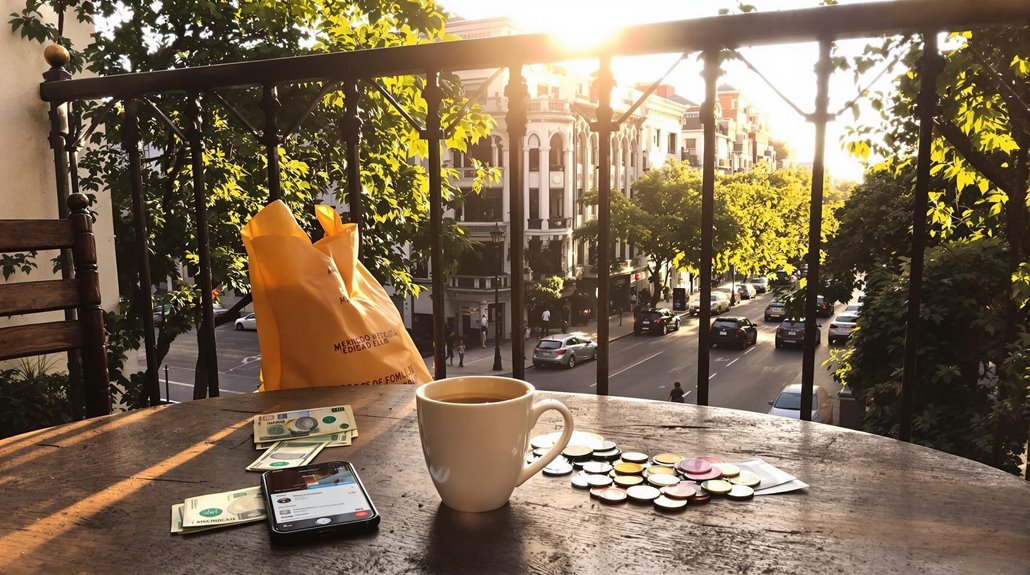
You'll need between $1,500 to $2,500 USD monthly to live comfortably in Mexico City, depending on your lifestyle choices. A one-bedroom apartment costs $400-$500 in average areas, while groceries run about $700-$800 per month. Basic utilities, internet, and transportation add another $150-$250 to your expenses. Living costs are roughly 71% lower than New York City, making Mexico City an attractive option for those seeking an affordable metropolitan experience.
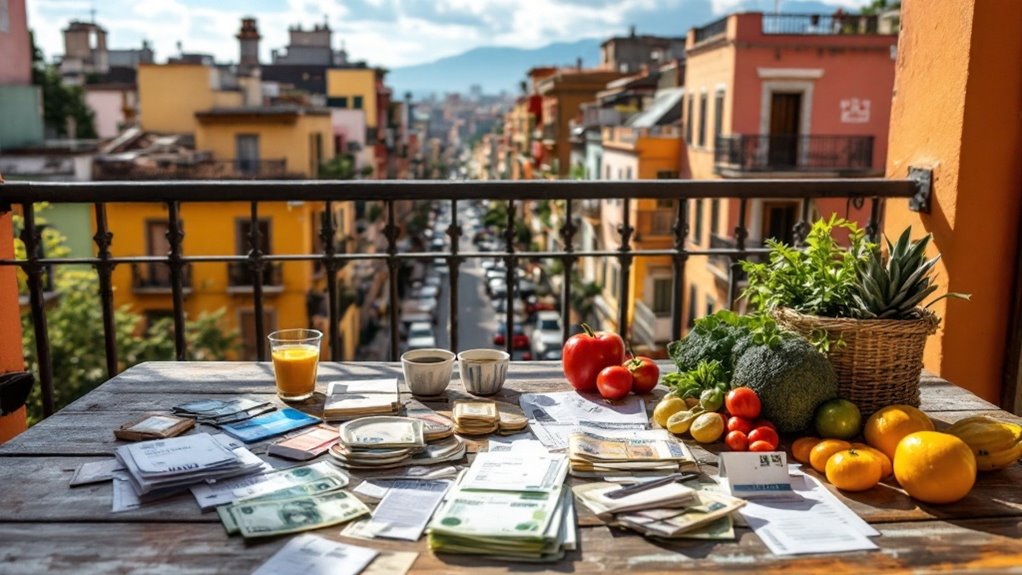
While Mexico City offers a considerably lower cost of living compared to many major global cities, you'll still need to budget carefully to manage your monthly expenses.
Mexico City's affordability shines compared to other global capitals, but smart budgeting remains essential for financial success.
For a comfortable lifestyle, you can expect to spend around 14,000-15,000 MXN monthly on groceries, which includes essentials like milk, bread, and protein. A family of four can expect their monthly expenses to be around 52,404 MXN without rent.
Your basic utilities, including electricity, water, and garbage services, typically range from 500-2,550 MXN, while internet and mobile plans will add another 600-1,600 MXN to your monthly costs.
Transportation costs remain relatively affordable, with public transit passes costing 200-780 MXN monthly, though if you're driving, you'll need to factor in gasoline at 83-105 MXN per gallon. Living in popular neighborhoods can increase your overall monthly expenses due to higher rental and service costs.
For entertainment, budget for dining out, where casual restaurant meals cost 100-500 MXN per person.
Three distinct tiers characterize Mexico City's housing market, with options ranging from affordable suburban rentals to luxury properties in prime neighborhoods.
You'll discover the most budget-friendly options in suburban areas, where three-bedroom apartments typically cost $600-$730 per month. For those seeking upscale living, prime areas like Polanco and Roma command higher prices. Properties near metro stations have experienced 7% value appreciation in the past year.
Here's what you can expect to pay for different housing options:
Keep in mind that rental prices have increased 10-15% citywide in 2024, with gentrified neighborhoods seeing even steeper rises of 20-30%.
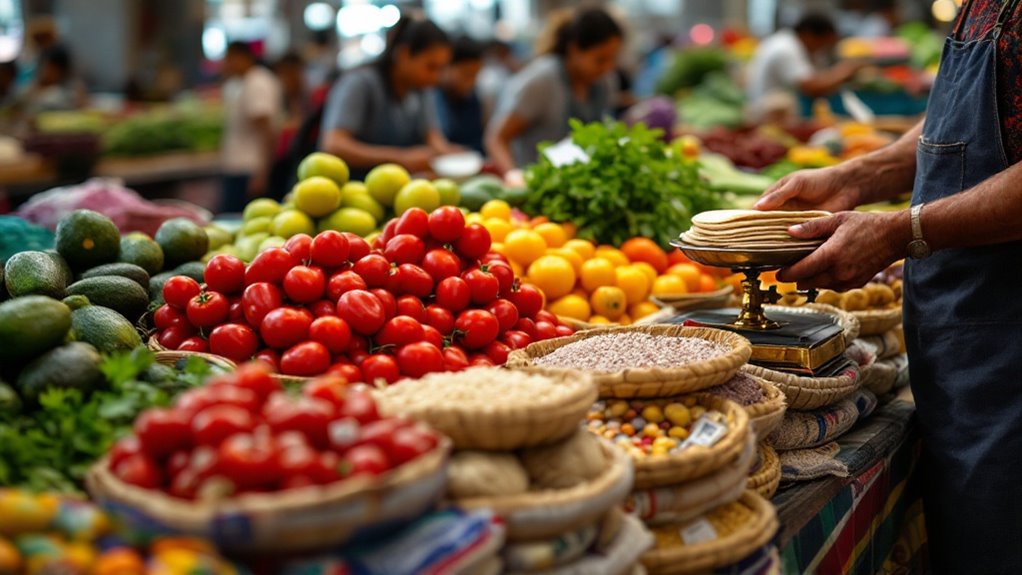
After securing your housing in Mexico City, you'll discover the need to budget for one of your biggest regular expenses: food and groceries.
Based on a minimum of 3,615.87 MXN recommended for adequate monthly food expenses, you can expect to spend between 2,000-3,000 MXN monthly on groceries as a single person, though you'll uncover significant savings by shopping strategically. Local markets offer fresh produce like tomatoes for 6.83 MXN per 0.20 kg, while staples such as chicken fillets cost 21.65 MXN per 0.15 kg.
If you're planning to dine out, budget around 200 MXN for an inexpensive restaurant meal or 800 MXN for a mid-range dinner for two.
To keep costs down, you'll want to prioritize outdoor markets over supermarkets, stick to locally produced goods, and take advantage of government price controls on basic items like eggs, milk, and beans.
Transportation costs in Mexico City will considerably impact your monthly budget, with several options available to match different needs and preferences.
When comparing public transit to private vehicle costs, you'll discover that using a bus pass will set you back about ₵300 monthly, while driving expenses for fuel and maintenance average around ₵170 per month. The Metrobús system charges 6 pesos per trip and allows unlimited transfers across all its lines.
Consider these key factors when choosing your transportation method:
Your choice should align with your lifestyle, budget constraints, and daily commuting patterns.
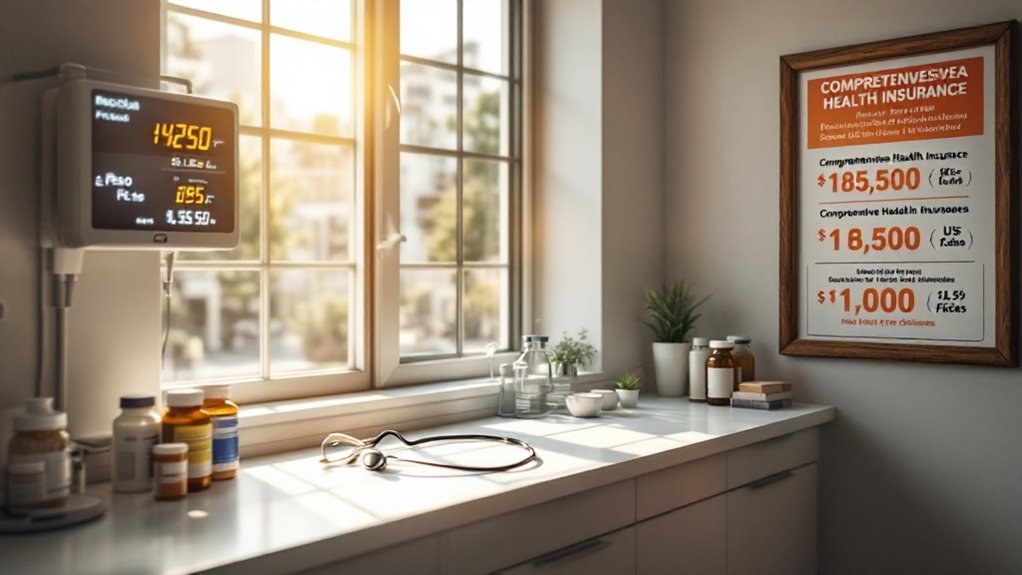
Medical care in Mexico City presents a unique blend of affordability and quality, with options that will suit various budgets and needs.
Mexico City's healthcare system balances cost-effective options with quality medical services, making it accessible for diverse financial situations.
You'll discover routine check-ups cost just $12-15, while specialist visits range from $25-50 without insurance. For extensive coverage, you can choose between public healthcare through IMSS at roughly $40 monthly or private insurance plans starting at $1,000 annually.
If you're planning to stay long-term, you might want to combine IMSS coverage with a private supplemental plan for the best of both worlds. Surgical procedures in Mexico City are particularly cost-effective, costing about one-third the price of similar procedures in the United States.
While public facilities offer basic care at lower costs, private hospitals provide English-speaking staff and shorter wait times.
You'll also appreciate that many medications are available over-the-counter at considerably lower prices than in countries like the US.
Mexico City's lively entertainment scene offers an impressive array of activities that won't break your budget. The city provides diverse options for every interest, from cultural experiences to outdoor adventures, with many attractions offering excellent value for money.
For outdoor enthusiasts, you'll discover free access to Chapultepec Park, affordable bike rentals, and picnic opportunities. For those looking to stay active, a monthly gym membership costs around M$1,561 in the business district.
The local markets offer authentic souvenirs and handicrafts at reasonable prices.
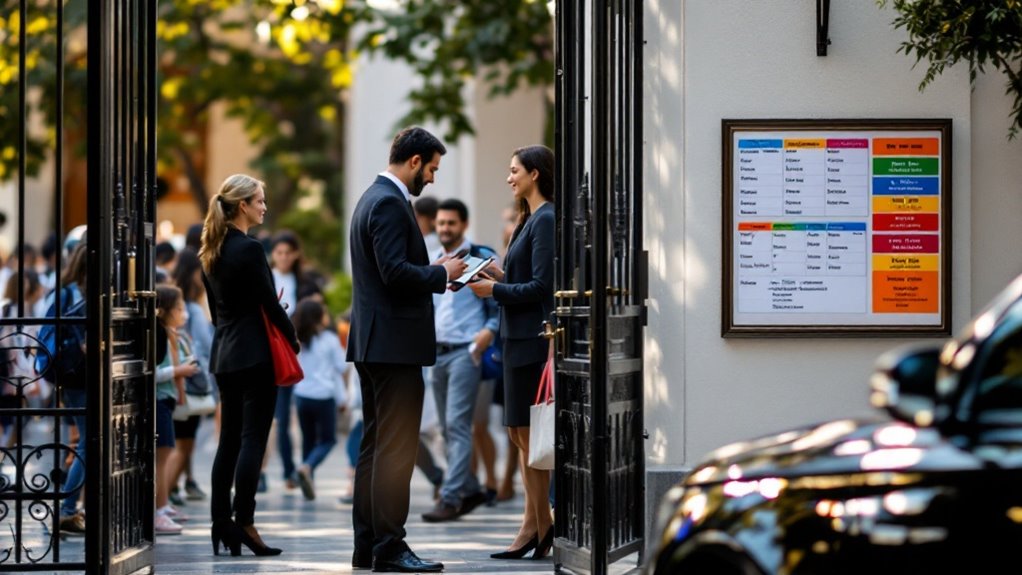
While public education in Mexico City is technically free, parents should anticipate various mandatory expenses that can greatly impact their monthly budget.
The average family spends up to half their monthly income on school-related costs when they have multiple children attending.
You'll need to budget around Mex$9,689 per child for annual back-to-school supplies, plus Mex$700 monthly for classroom materials.
Uniforms will set you back over Mex$3,000 yearly, far exceeding government allowances.
If you're considering private education, prepare for significant costs.
Primary school tuition averages Mex$45,000 annually, with monthly fees ranging from Mex$7,000 to Mex$15,000.
International schools command premium prices, from Mex$170,000 to Mex$785,000 per year.
Don't forget to factor in additional expenses like transportation and extracurricular activities, which can substantially increase your monthly education budget.
Essential utilities in Mexico City's residential areas follow a tiered pricing system that rewards conservative usage.
You'll discover that utilities are generally affordable, with bills typically arriving every two months. For an 85m² apartment, you can expect to pay around MX$1,182.90 monthly for all basic services combined.
Your utility costs will depend on your consumption levels:
The city has allocated MX$15 billion for water system improvements to ensure reliable service delivery across residential areas.
To keep your costs down, consider adopting energy-efficient habits and monitoring your usage patterns, as higher consumption tiers can lead to rates comparable to those in the United States.
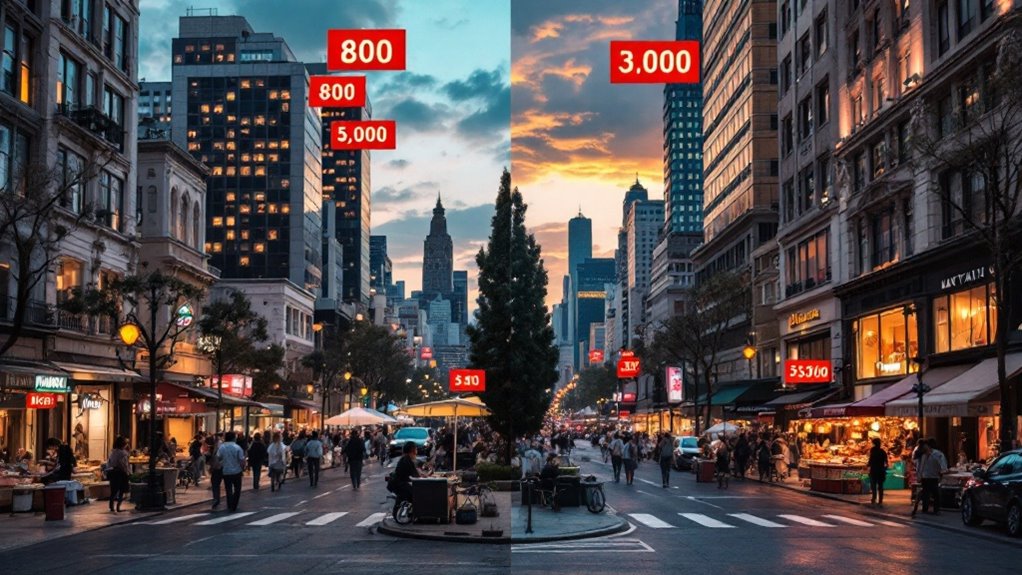
Living costs in different cities can feel like comparing apples to oranges, but you'll uncover Mexico City offers remarkable value compared to major global destinations.
For example, a family of four in Mexico City spends around $3,028 monthly, while New York City demands a staggering $8,925. You'll find significant savings on everyday expenses, from housing to transportation. Restaurant dining reveals substantial differences, with a dinner for two costing $45.20 in Mexico City versus $111 in New York City.
A single person's rent in Mexico City averages $611, compared to New York's $2,620, and you'll pay just $17.87 for a monthly transit pass versus $65.15 in NYC.
While Mexico City ranks as the 7th most expensive city in Latin America, it's still 71% cheaper than New York, making it an attractive option for those seeking a lively urban lifestyle without the hefty price tag.
Living in Mexico City can cost between $800-2,500 per month, depending on your lifestyle choices. Take Sarah, an American freelancer who moved there in 2022 – she lives comfortably on $1,200 monthly in Roma Norte, splitting her budget between a studio apartment ($500), local food markets ($200), and transportation ($50). You will discover that with careful planning and smart spending habits, you can enjoy this lively metropolis while staying within your budget.